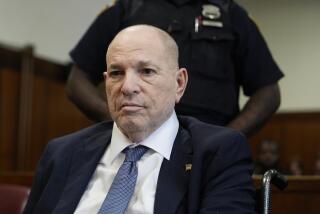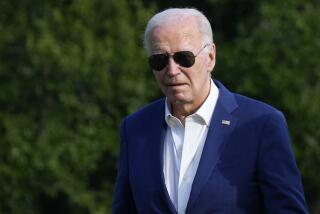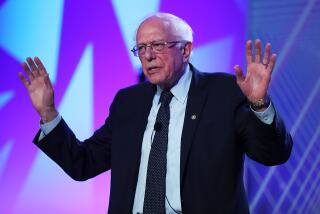Bernie Sanders suffered a heart attack, campaign reveals

Bernie Sanders suffered a heart attack this week, his presidential campaign disclosed Friday as the Vermont senator was discharged from a Las Vegas hospital.
The disclosure, which came 2½ days after Sanders was first hospitalized, is likely to bring further scrutiny of the 78-year-old’s health as he seeks to resume campaigning to become the nation’s oldest president.
Sanders, 78, waved as he walked out the hospital Friday afternoon. Sanders had been treated after experiencing chest pain at a Tuesday campaign event; doctors placed two stents into his heart to correct a blocked coronary artery, according to his campaign.
The candidate plans to participate in the Oct. 15 Democratic debate in Ohio, but it’s not clear how soon he will return to the campaign trail after canceling upcoming events.
“I want to thank the doctors, nurses and staff at the Desert Springs Hospital Medical Center for the excellent care that they provided,” Sanders said in a statement. “After two and a half days in the hospital, I feel great, and after taking a short time off, I look forward to getting back to work.”
Roy Behr, a Democratic strategist who is unaffiliated with any presidential candidate in the race, said the additional detail that Sanders had suffered a heart attack is “clearly not helpful to his campaign.” But Behr added that health concerns tend to be more politically harmful when they are “cumulative” — building a narrative about the candidate that can be hard to reverse.
Sanders’ campaign had previously disclosed he had been treated for a blocked artery, a relatively common and low-risk procedure. In the campaign’s statement Friday, Sanders’ doctors revealed that he was also diagnosed with a myocardial infarction, another term for a heart attack, which describes when the heart suffers from a lack of oxygen due to a blocked artery or slow blood flow. The campaign did not say why it had not released details about the heart attack sooner.
“After presenting to an outside facility with chest pain, Sen. Sanders was diagnosed with a myocardial infarction,” said the statement, attributed to Dr. Arturo E. Marchand Jr. and Dr. Arjun Gururaj.
“He was immediately transferred to Desert Springs Hospital Medical Center. The senator was stable upon arrival and taken immediately to the cardiac catheterization laboratory, at which time two stents were placed in a blocked coronary artery in a timely fashion. All other arteries were normal. His hospital course was uneventful with good expected progress. He was discharged with instructions to follow up with his personal physician.”
Heart attacks can be deadly, but survival rates and treatments have improved in recent decades. About 15% of sufferers never reach the hospital, but the prognosis is good for survivors who receive treatment quickly, with many leaving the hospital with limited heart damage, according to a summary from Harvard Medical School.
Patients are usually put on medication including aspirin and urged to rest while the body recovers, said Helga Van Herle, associate professor of medicine in cardiology at the Keck School of Medicine at USC. “Those are all good signs,” she said.
Van Herle said it’s common for heart attack sufferers to return to work in good health.
“I’m sure there’s going to be a lot of concern and conjecture about what this means, but it is a common occurrence in Western society, and a lot of people do quite well after a heart attack if they notice the symptoms soon and get treatment quickly,” Van Herle said.
This will likely not be the last time that a candidate’s health comes under close scrutiny on the campaign trail. The top candidates for both parties — Sanders, former Vice President Joe Biden, Massachusetts Sen. Elizabeth Warren and President Trump — are all in their 70s.
Behr, the strategist, said voters might overlook one health incident. “But if there becomes two or three reminders, then they start to look at everything in a different light,” Behr said. He noted that even though Sanders was the oldest candidate in the race, voters had more commonly been raising concerns about the health of Biden, 76.
“The biggest challenge is that Bernie Sanders faces at the moment aren’t about his health, they’re about whether he has lost his appeal amongst progressive voters to Elizabeth Warren, and whether he is starting to slide in some of the early states,” Behr said. “Like I said, this is clearly not helpful, but if he loses, it’s not going to be based on this single thing.”
More to Read
Get the L.A. Times Politics newsletter
Deeply reported insights into legislation, politics and policy from Sacramento, Washington and beyond. In your inbox three times per week.
You may occasionally receive promotional content from the Los Angeles Times.











